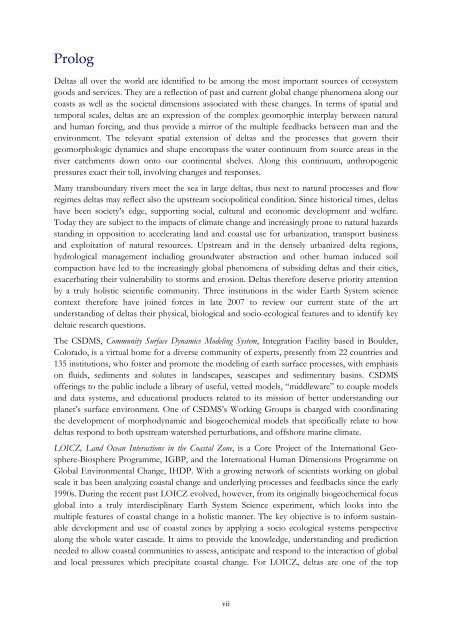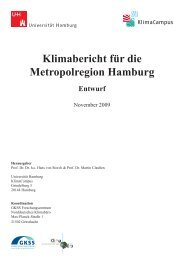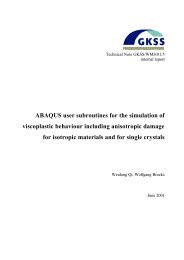Dynamics and Vulnerability of Delta Systems - loicz
Dynamics and Vulnerability of Delta Systems - loicz
Dynamics and Vulnerability of Delta Systems - loicz
Create successful ePaper yourself
Turn your PDF publications into a flip-book with our unique Google optimized e-Paper software.
Prolog<br />
<strong>Delta</strong>s all over the world are identified to be among the most important sources <strong>of</strong> ecosystem<br />
goods <strong>and</strong> services. They are a reflection <strong>of</strong> past <strong>and</strong> current global change phenomena along our<br />
coasts as well as the societal dimensions associated with these changes. In terms <strong>of</strong> spatial <strong>and</strong><br />
temporal scales, deltas are an expression <strong>of</strong> the complex geomorphic interplay between natural<br />
<strong>and</strong> human forcing, <strong>and</strong> thus provide a mirror <strong>of</strong> the multiple feedbacks between man <strong>and</strong> the<br />
environment. The relevant spatial extension <strong>of</strong> deltas <strong>and</strong> the processes that govern their<br />
geomorphologic dynamics <strong>and</strong> shape encompass the water continuum from source areas in the<br />
river catchments down onto our continental shelves. Along this continuum, anthropogenic<br />
pressures exact their toll, involving changes <strong>and</strong> responses.<br />
Many transboundary rivers meet the sea in large deltas, thus next to natural processes <strong>and</strong> flow<br />
regimes deltas may reflect also the upstream sociopolitical condition. Since historical times, deltas<br />
have been society’s edge, supporting social, cultural <strong>and</strong> economic development <strong>and</strong> welfare.<br />
Today they are subject to the impacts <strong>of</strong> climate change <strong>and</strong> increasingly prone to natural hazards<br />
st<strong>and</strong>ing in opposition to accelerating l<strong>and</strong> <strong>and</strong> coastal use for urbanization, transport business<br />
<strong>and</strong> exploitation <strong>of</strong> natural resources. Upstream <strong>and</strong> in the densely urbanized delta regions,<br />
hydrological management including groundwater abstraction <strong>and</strong> other human induced soil<br />
compaction have led to the increasingly global phenomena <strong>of</strong> subsiding deltas <strong>and</strong> their cities,<br />
exacerbating their vulnerability to storms <strong>and</strong> erosion. <strong>Delta</strong>s therefore deserve priority attention<br />
by a truly holistic scientific community. Three institutions in the wider Earth System science<br />
context therefore have joined forces in late 2007 to review our current state <strong>of</strong> the art<br />
underst<strong>and</strong>ing <strong>of</strong> deltas their physical, biological <strong>and</strong> socio-ecological features <strong>and</strong> to identify key<br />
deltaic research questions.<br />
The CSDMS, Community Surface <strong>Dynamics</strong> Modeling System, Integration Facility based in Boulder,<br />
Colorado, is a virtual home for a diverse community <strong>of</strong> experts, presently from 22 countries <strong>and</strong><br />
135 institutions, who foster <strong>and</strong> promote the modeling <strong>of</strong> earth surface processes, with emphasis<br />
on fluids, sediments <strong>and</strong> solutes in l<strong>and</strong>scapes, seascapes <strong>and</strong> sedimentary basins. CSDMS<br />
<strong>of</strong>ferings to the public include a library <strong>of</strong> useful, vetted models, “middleware” to couple models<br />
<strong>and</strong> data systems, <strong>and</strong> educational products related to its mission <strong>of</strong> better underst<strong>and</strong>ing our<br />
planet’s surface environment. One <strong>of</strong> CSDMS’s Working Groups is charged with coordinating<br />
the development <strong>of</strong> morphodynamic <strong>and</strong> biogeochemical models that specifically relate to how<br />
deltas respond to both upstream watershed perturbations, <strong>and</strong> <strong>of</strong>fshore marine climate.<br />
LOICZ, L<strong>and</strong> Ocean Interactions in the Coastal Zone, is a Core Project <strong>of</strong> the International Geosphere-Biosphere<br />
Programme, IGBP, <strong>and</strong> the International Human Dimensions Programme on<br />
Global Environmental Change, IHDP. With a growing network <strong>of</strong> scientists working on global<br />
scale it has been analyzing coastal change <strong>and</strong> underlying processes <strong>and</strong> feedbacks since the early<br />
1990s. During the recent past LOICZ evolved, however, from its originally biogeochemical focus<br />
global into a truly interdisciplinary Earth System Science experiment, which looks into the<br />
multiple features <strong>of</strong> coastal change in a holistic manner. The key objective is to inform sustainable<br />
development <strong>and</strong> use <strong>of</strong> coastal zones by applying a socio ecological systems perspective<br />
along the whole water cascade. It aims to provide the knowledge, underst<strong>and</strong>ing <strong>and</strong> prediction<br />
needed to allow coastal communities to assess, anticipate <strong>and</strong> respond to the interaction <strong>of</strong> global<br />
<strong>and</strong> local pressures which precipitate coastal change. For LOICZ, deltas are one <strong>of</strong> the top<br />
vii





